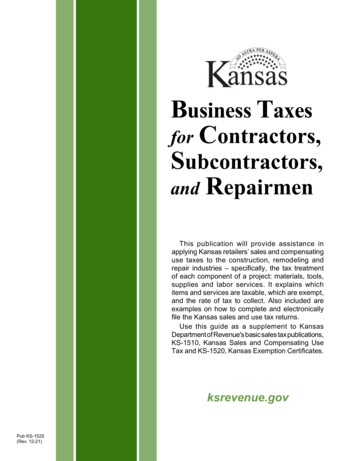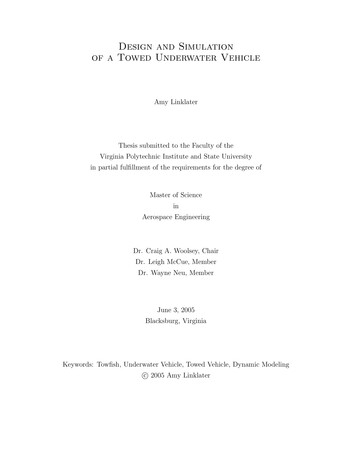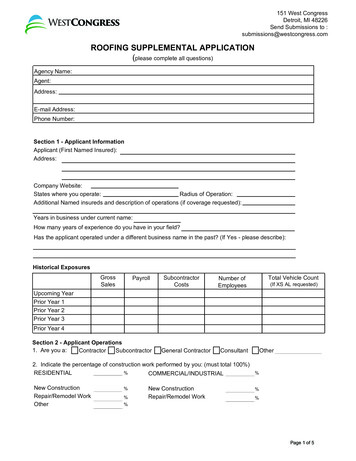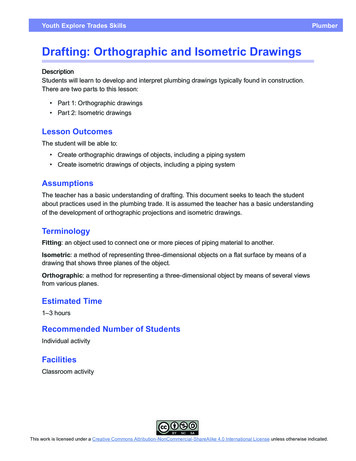
Transcription
Business Taxesfor Contractors,Subcontractors,and RepairmenThis publication will provide assistance inapplying Kansas retailers’ sales and compensatinguse taxes to the construction, remodeling andrepair industries – specifically, the tax treatmentof each component of a project: materials, tools,supplies and labor services. It explains whichitems and services are taxable, which are exempt,and the rate of tax to collect. Also included areexamples on how to complete and electronicallyfile the Kansas sales and use tax returns.Use this guide as a supplement to KansasDepartment of Revenue's basic sales tax publications,KS-1510, Kansas Sales and Compensating UseTax and KS-1520, Kansas Exemption Certificates.ksrevenue.govPub KS-1525(Rev. 12-21)
TABLE OF CONTENTSINTRODUCTION. 3CHARGING AND COLLECTING SALES TAX . 17What is Taxable in Kansas?Sales Tax StructureDefinitionsThe Cardinal RuleThe Sales Tax BaseInvoicing the CustomerCONTRACTOR PURCHASES. 4REPORTING AND PAYING SALES TAX. 18MaterialsToolsMachinery and EquipmentOut-of-State PurchasesPaying Tax on Contract Use of InventoryWhich Filing - ST-16 or ST-36Accelerated Monthly Filing StatusSample Completed Sales Tax FilingsLABOR SERVICES . 5COMPENSATING USE TAX. 22Residential Labor ServicesOriginal ConstructionTaxable Labor ServicesMaintenance Contracts and WarrantiesLocal Sales Tax ApplicationContractor’s LiabilityRepairmenResale of LaborThird Party InstallersNon-Taxable ServicesWhat is Compensating Use Tax?Sample Completed Consumers’ Use Tax FilingHow to Register, Report and Pay Use TaxKANSAS CUSTOMER SERVICE CENTER. 23File, Pay and Make Updates ElectronicallyWhat can I do ElectronicallyRequirements to File and PayPay by Credit CardWire TransfersEXEMPT PROJECTS. 10TAXATION RESOURCES AND FORMS . 24Exempt CustomersCustomers Who are NOT ExemptSales that are ExemptProject Exemption Certificates (PECs)“By Or On Behalf Of”Other Exempt ProjectsFarm, Ranch, and Feed Lot ProjectTaxpayer Assistance CenterWebsite – ksrevenue.govPolicy Information Library (PIL)Forms and Exemption Certificates:Agricultural (ST-28F)Contractor-Retailer (ST-28W)Integrated Production Machinery & Equipment (ST-201)Multi-Jurisdiction (ST-28M)Request for Project (PR-76)Request for a Project (PR-70b)Sample Project (PR-74)Project Completion Certification (PR-77)Warehouse Machinery and Equipment (ST-203)ADDITIONAL CONTRACTOR INFORMATION. 14Contractor Q & A – Review of the General RulesContractor Decision MatrixCONTRACTORS RESPONSIBILITIES. 15Who Must Register?Nonresident Contractor ObligationsHow to RegisterASSISTANCE. BACK COVERIf there is a conflict between the law and information found in this publication, the law remains the final authority. Under no circumstancesshould the contents of this publication be used to set or sustain a technical legal position. A library of current policy information is alsoavailable on the Kansas Department of Revenue’s website at: ksrevenue.gov2
the taxable labor services portion of the contract, regardlessof its size.KANSAS SALES TAXTax Jurisdiction AssistanceWHAT IS TAXABLE IN KANSAS?To assist you in collecting the correct sales tax percentage,the Department of Revenue has developed Pub. KS-1700,Sales Tax Jurisdiction Codes. This publication is analphabetical listing of all Kansas counties, incorporated citiesand special taxing jurisdictions, their tax rates and jurisdictioncodes for tax reporting, and the effective dates of the taxrate. Since local rates may only be changed at the start ofa calendar quarter, Pub. KS-1700 is updated quarterly andthose quarterly updates are available on our website at:ksrevenue.govAn online sales tax rate locator is also available on ourwebsite. The “locator” provides sales tax rates by streetaddress or zip code. Retailers also have the ability to uploadsales tax rates and jurisdiction codes for all of their customersby electronically transmitting their customer’s names andaddresses to us in a comma delimited format.Kansas Retailers’ Sales Tax generally applies to: 1) theretail sale, rental, or lease of tangible personal property, and,2) the sale of labor services to install, apply, repair, service,alter, or maintain tangible personal property.Tangible personal property is goods or merchandise thatcan be owned or leased, has a physical presence, and canbe moved (sometimes with great difficulty). Tangible personalproperty is different from intangible personal property (stocksand bonds) or real property (land or buildings). Sales tax isnot imposed on the sale of real or intangible property.Examples of tangible personal property in the constructionand repair industries include: building materials and supplies;plumbing, heating, air conditioning and electrical fixtures orsupplies; paint and wallpaper; dirt, rock or sand; flowers, grass,trees and shrubs; repair parts; machinery, equipment andvehicles. As a general rule, all of these items are subject tosales tax when purchased by contractors and subcontractors.Labor services of installing or applying tangible personalproperty is subject to sales tax (as a general rule). Therefore,the labor fee contractors and subcontractors charge to installor apply the materials is subject to sales tax. The installationof lumber, roofing, siding, electrical and plumbing materials,etc., and the application of paint and wallpaper are examplesof installing or applying tangible personal property. Onceinstalled or applied, tangible personal property often becomesa part of real property.The labor charged by repairmen to repair, service, alter, ormaintain tangible personal property is also generally subjectto sales tax. Examples include the repair or servicing ofbicycles, equipment, furniture, lawnmowers, vehicles and thelike. Generally, sales tax is due on labor services even whenthe tangible personal property is fastened to, connected with,or built into real property, such as the repair of a restaurant’sstove, oven, etc.Residential and original construction contracts are twotypes of real property projects that are exceptions to thesegeneral rules of taxability of labor services. This publicationwill explain the taxable, nontaxable, and exempt labor servicesusing common industry examples.DEFINITIONSContractor means a person or business, includingcontractor-retailers, that contract to furnish materials and thelabor to install or apply those materials into real property,including buildings and other structures. A contractor expendsits labor and skill to convert building materials into realproperty improvements and sometimes contracts to furnishlabor only, using materials provided by the property owner orby another contractor. Contractor means general contractor,subcontractor, or specialty contractor, unless the contextindicates otherwise. In general, contractors are required topay sales tax on their materials and collect sales tax from theircustomer on the fee they charge for installing or applying thematerials. See the following Contractor Purchases section fora discussion of the specific rules pertaining to contractors.NOTE: Throughout this guide the term contractor will be used.Unless otherwise specifically noted, the term contractor willalso include subcontractors and contractor-retailers performingthe services described under the contractor definition.SALES TAX STRUCTUREThe Kansas statewide sales (and use) tax rate is 6.5%. Inaddition to the state sales tax, Kansas counties, incorporatedcities and special taxing districts may impose a local salestax. Local sales tax rates currently range from .10% to 3%.The local rate(s) are added to the state rate to arrive at thetotal sales tax percentage collected by a retailer or contractor.Kansas is a participating state in the Streamlined SalesTax Project and has enacted legislation incorporating theStreamline definitions and tax structure into Kansas salestax law. Since July 1, 2003, the rate of tax charged on retailsales of goods or taxable services has been based on wherethe customer takes delivery of the property (material, parts)or makes first use of the taxable service. Retailers shippinggoods to a Kansas customer in another taxing jurisdiction willcharge the tax rate in effect at the delivery or ship-to address.Contractors will charge the tax rate in effect at the job site on3Contractor-retailer means a person or business that actsas a contractor when it performs construction contracts andas a retailer when it sells tangible personal property at retail.A contractor-retailer holds itself out as providing constructionservices and operates a retail showroom or otherwisemaintains an untaxed resale inventory to sell merchandisefrom. A contractor-retailer withdraws merchandise from theuntaxed resale inventory to use in their construction projectsand to sell at retail. In general, when a contractor-retailerwithdraws merchandise from inventory to install for another,the contractor-retailer must accrue sales tax on the cost of thematerials and collect sales tax from its customer on the feethey charge for installing or applying the materials.The discussion of the specific rules pertaining to contractorsapply equally to contractor-retailers when the contractor-retaileris acting as a contractor by installing materials for others.Repairmen means a person or business whose workinvolves the repair, service, alteration or maintenance oftangible personal property. In general, the sales tax rules thatapply to contractors do not apply to repairman. In general,repairman follow the same rules as retailers (e.g., they
purchase materials and parts exempt from sales tax andcharge their customer sales tax on the total bill).Retailer includes a person or business that sells buildingmaterials and other tangible personal property at retail.Contractor-retailers are treated like retailers when they sellor repair tangible personal property at retail without agreeingto install it and when they sell or repair appliances, electronicproducts, and certain other listed items at retail and agree toprovide set up services.Fabricator means a person or business that produces anarticle of tangible personal property to the special order of acustomer. In essence, the sales by fabricators are treated asretail sales. When the article is delivered to a buyer in Kansas,the fabricator is required to collect state and local Kansassales or use tax on the selling price of the fabricated article.Examples of businesses that are treated as fabricators for salestax purposes include: Copy and Duplicating Services, DesktopPublishing Companies, Dental Laboratories, Drapery Makers,Meat Cutting and Butchering Services, Photographers, SignMakers, Tailors and Seamstresses, and Taxidermists.EXAMPLE: A lumberyard buys lumber and paint directly froma manufacturer using a Kansas Resale Exemption Certificate.The lumber yard will collect sales tax when these items are soldto contractors or the general public.When a contractor-retailer removes materials from hisinventory to use on a contract job, the contractor-retailerbecomes the final consumer, and must accrue sale tax on thecost of the materials. The Kansas sales tax cannot be avoidedby retailing the materials to an out-of-state location when thecontractor-retailer is acting as a contractor (i.e., providing andinstalling materials for another).EXAMPLE: A contractor-retailer located in Kansas City, KSremoves materials from inventory to install for a customer locatedin Raytown, MO. The contractor-retailer must accrue Kansasretailers’ sales tax on the cost of the items to him at the KansasCity, KS sales tax rate.Accruing sales tax is done by reporting and paying salestax on the contractor-retailer’s own sales tax return. The taxrate will be the state and local rate in effect at the inventorylocation. The tax is due at the time the materials are removedfrom inventory, even though they may be used in a projectoutside of Kansas. See Reporting and Paying Sales Taxherein for an illustrated example of how to report and paysales tax on personal or contract use of inventory.All materials and parts purchased by contractorsand contractor-retailers for use in original construction,remodeling, or repair projects are TAXABLE. The onlyway materials may be purchased by a contractor or removedfrom inventory by a contractor-retailer exempt from sales taxis with an appropriate exemption certificate.CONTRACTOR PURCHASESMATERIALSGENERAL RULE: MATERIALS ARE TAXABLEAll contractors (whether contractors or contractor-retailers)are considered to be the final user or consumer of thematerials they install for others, and must pay Kansas sales oruse tax on them. Under K.S.A. 79-3603(l), sales tax applies to:TOOLS“. the gross receipts received from the sales of tangiblepersonal property to all contractors, subcontractors andrepairmen for use by them in erecting structures, or building onor otherwise improving, altering, or repairing real or personalproperty.”GENERAL RULE: TOOLS/SUPPLIES ARE TAXABLEContractors, subcontractors and repairmen are the finalconsumers of all tools used to perform their services. Youmust therefore pay sales or use tax when buying your tools— there is no exception or exemption to this rule. Followingis a representative, but not exclusive list, of taxable tools:ContractorsContractors buying materials and supplies from a Kansasretailer must, by law, pay the retailer (and the retailer mustcollect) the appropriate Kansas state and local sales tax onthe retail sale. Retailers may offer contractor discounts, butthe sale of materials to a contractor is a taxable retail sale.See page 6 for a discussion on materials purchased outsideof Kansas for use within Kansas.Contractors cannot use a ST-28A Kansas ResaleExemption Certificate or ST-28W Contractor-RetailerExemption Certificate (herein) to purchase their materialswithout tax. As a contractor, you are by definition the finalconsumer of the materials, and not a retailer of them. Thesales tax is due at the time of purchase even when thematerials are used on a project in another state.drills, drill bitshammers, nail gunspaint brushes and rollersplanes, saws, sanderssand paper, caulking gun, chalkContractor-retailers may purchase tools exempt from salestax if the items are part of their resale inventory. However,like their material purchases, when the tools are removedfrom inventory they are taxable. The contractor-retailer willeither collect sales tax when the tools are sold to the generalpublic or to other contractors, or will report and pay sales taxon the cost of tools removed from inventory and used by thecontractor-retailer or its employees.Lease/RentalSpecialized or expensive tools are often leased or rentedrather than purchased. Contractors and contractor-retailersmust pay sales tax on the lease or rental of any tools. Onlytools leased or rented for an exempt project using a ProjectExemption Certificate (herein) are exempt from tax.EXAMPLE: A contractor in Olathe, KS will pay sales tax onbuilding materials purchased from a supplier in Kansas City,KS, even though they will be installed at a home or office inIndependence, MO.Contractors-retailersContractor-retailers may purchase their inventory exemptfrom sales tax using the Contractor-Retailer ExemptionCertificate. The contractor-retailer will then collect sales taxwhen these items are sold at retail.pliers, socket setsscrewdrivers, wrenchessteel tapes, t squarestool belts, tool boxesskid loaders, generatorsMACHINERY and EQUIPMENT4GENERAL RULE: MACHINERY AND EQUIPMENTARE TAXABLE.
PurchasesLike tools, machinery and equipment purchased bycontractors are subject to sales tax. Contractors andcontractor-retailers alike must pay sales or use tax whenbuying construction or office equipment. Examples include:air compressorsbackhoes and caterpillarscalculators and computerscellular telephonesremodeling, renovation, repair or replacement of a residence.A residence means only those enclosures within whichindividuals customarily live. Residences include single-familyhomes, duplexes, townhouses, apartments, condominiums.Residences may include mobile and manufactured homes ifthey are affixed to real property by water, sewer and electricalconnections. A residence may be a primary residence or asecondary residence, such as a summer home. Roominghouses, boarding houses, apartment houses, nursing homes,retirement homes, dormitories, or any other enclosure thathas been constructed for use, or has as part of its purpose aplace of human habitation, is considered to be residential. Aresidence also includes the land improvements immediatelysurrounding it, such as yards, garages, sidewalks, drivewaysthat service the residence.Residences do not include transient accommodations,such as hotels, motels, inns, apartment hotels, tourist courts,resort lodges, mobile and manufactured homes not affixed toreal property, motor homes, travel trailers or other recreationalvehicles, and other accommodations routinely rented for a periodof 28 consecutive days or less. Apartment hotels registered fortransient guest tax purposes may not claim exemption as aresidence on individual units leased or rented to the public,regardless of how long an individual unit may be occupied.copiers, fax machinesgeneratorsshop vacsvehiclesLease/RentalThe general rule is that when construction tools andequipment are leased or rented for a project, the lease or rentalis taxable. However, tools and equipment may be leased orrented tax exempt when a Project Exemption Certificate hasbeen issued for the project, and the equipment will be usedonly on that exempt project. The following items are taxable,even when leased or rented with a Project ExemptionCertificate: Portable offices, office equipment, constructiontrailers, port-a-potties, motor vehicles, telephones and storagecontainers. See Exempt Projects herein.Lease or Rental with an OperatorThe lease or rental of equipment with an operator is notconsidered to be a lease/rental of tangible personal property(taxable), but providing a service. Whether or not the serviceis taxable depends on the rules for labor services (see LaborServices). The rental would be taxable if the service beingperformed by the equipment/operator is a taxable service.EXAMPLE: A contractor agrees to install a new roof on anexisting single family dwelling in Kansas, supplying the materialsand labor. The contractor will pay sales tax on the materials atthe time of purchase; his labor charge is not taxable.Taxable Labor Services Performed at a ResidenceEXAMPLE: A contractor rents a backhoe to dig a trench; thebackhoe will be operated by the contractor’s employee. Thisequipment rental is subject to sales tax. However, if the contractcalls for the backhoe company to furnish both the equipment andthe operator, the tax treatment of this rental depends on the servicebeing performed. If only excavation work is being done, the rental isnot taxable (the service of excavating is not a taxable service, seepage 10). If the excavation is part of laying cable, for example, andthe charge for excavation is not separately stated, the equipmentrental is taxable (installing/laying cable is a taxable service).NOTE: Port-a-potties (portable toilets) are considered to be arental of tangible personal property subject to Kansas sales tax.Labor services are not automatically exempt simplybecause they are performed at a residential property. Thefollowing services are taxable: 1) labor to install tangiblepersonal property as part of its retail sale — i.e., appliances,draperies, etc. and, 2) labor to repair tangible personalproperty — i.e., dishwashers, washers/dryers, TVs, etc.Dual Use Buildings - Allocation RatioNot all buildings are exclusively residential in nature.When a building is used for both residential and commercialpurposes, charges for labor services must be allocatedbetween the residential portion of the building (exempt) andthe commercial portion of the building (generally taxable).Charges for labor services that cannot be entirely assignedto the residential or commercial portions of a building are tobe allocated based on square footage of the areas exclusivelyresidential and exclusively commercial. This allocation ratiomust be used when performing labor services on:OUT-OF-STATE PURCHASESWhen Kansas residents (whether retailer, contractor orindividually) buy materials, supplies, tools, or equipment froma business in another state for use within Kansas, and do notpay a sales tax equal to or greater than the sales tax rate ineffect at their location, a Kansas compensating (use) tax is due.If the out-of-state retailer is not registered to collect Kansascompensating use tax, you must pay Kansas consumers’compensating tax directly to the Department of Revenue.See Compensating Use Tax for reporting and paying Use Tax. LABOR SERVICESEXAMPLE: A contractor agrees to paint the exterior of anGENERAL RULES: RESIDENTIAL LABOR–EXEMPT;ORIGINAL CONSTRUCTION–EXEMPT;COMMERCIAL REMODEL–TAXABLE.RESIDENTIAL LABOR SERVICESServices performed to install or apply tangible personalproperty are exempt from sales tax when the servicesinvolve the original construction, reconstruction, restoration,apartment complexesbed and breakfastsdormitoriesnursing homesbusinesses that include the owner’s living quarters5existing bed and breakfast (also the owners’ residence) at acost of 4,000. The owners supply the paint. Fifty percent of thesquare footage of the building is guest rooms and bathrooms;25% is the owners’ private quarters and 25% is the squarefootage of the kitchen, laundry and porch facilities used by boththe owners and guests. The contractor charges the owner salestax on 75% of 4,000, or 3,000 (only the square footage usedexclusively as a residence is exempt from tax on the labor).
An allocation ratio must also be used on home businessesconducted in areas segregated from the living quarters and areopen to the walk-in public during regular business hours andother similar businesses. For the purpose of this exemption,a home office qualifies as part of a residence. Construction of a feedlot, including the fencing around eachpen.The construction of a building or facility on a site previouslyoccupied by a building or facility that has been demolished,razed, or dismantled is also considered to be originalconstruction if the building or facility is totally new, regardlessof whether the old foundation was also demolished. See alsoDemolition herein.EXAMPLE: You are rewiring a Victorian home for the artistwho lives there and also operates a gallery and gift shop in thelower floor of the home that is open to the public during normalbusiness hours. The gallery and gift shop occupy 30% of the totalsquare footage of the home. Since 70% of the home remainsresidential in nature, you will only charge sales tax on 30% ofthe total charge for labor; the materials are fully taxable.Mobile, Manufactured and Modular HomesLabor services performed to manufacture, construct, orassemble a modular home in the factory are exempt from salestax as original construction of a building or facility. Materialsare purchased exempt from sales tax by the manufacturer.Labor to construct a foundation or basement for the mobile,manufactured, or modular home, or the on-site construction ofa building or facility, such as a shed or water well, are exemptas original construction. Also exempt are the services to toe-inand/or attach a new mobile, manufactured, or modular home.As discussed in the residential section earlier, the saleof labor services of installing or applying tangible personalproperty in repairing or remodeling a mobile or manufacturedhome used as a residence is exempt from sales tax when themobile or manufactured home is affixed to real property bywater, sewer and electrical connections.Kansas sales tax law exempts 40% of the gross receiptsfrom the sale of new modular, manufactured or mobilehomes. Therefore, 60% of the selling price of a new modular,manufactured or mobile home is subject to the combinedstate and local sales tax rate in effect at the sale location.Destination sourcing does not apply to the retail sale ofmodular, manufactured or mobile homes. (The 40% exemptionincludes the installation of the home when the installation isincluded in the selling price.) The sale of a used modular,manufactured or mobile home is exempt from sales tax.ORIGINAL CONSTRUCTIONLabor services involving the installation or application oftangible personal property performed in connection with theoriginal construction of a building, facility are exempt fromsales tax. There are five types of projects considered to beoriginal construction. These are the: first or initial construction of a building1 or facility2; addition of an entire room or floor to an existing building orfacility; completion of any unfinished portion of an existing buildingor facility for the first owner; restoration, reconstruction, or replacement of a building,facility or utility structure3 damaged or destroyed by fire, flood,tornado, lightning, explosion, windstorm4, ice loading andattendant winds, terrorism or earthquake; and construction, reconstruction, restoration, replacement, orrepair of a bridge or highway.1A building is an enclosure (walls and a roof) where peoplecustomarily live or are employed, and includes enclosures that housemachinery, equipment, or other property. “Building” also includes theland improvements immediately surrounding the building such aslandscaping and driveways.2A facility is a mill, plant, refinery, oil well, gas well, water well, feedlotor any transmission or distribution line of any cooperative, nonprofit,membership corporation organized under or subject to the provisions ofK.S.A. 17-4601 et seq., and amendments thereto, or of any municipalor quasi-municipal corporation, including the land improvementsimmediately surrounding such facility.3A utility structure is the transmission and distribution lines owned byan independent transmission company or cooperative, the Kansaselectric transmission authority or natural gas or electric public utility.4Windstorm means straight line winds of at least 80 miles per houras determined by a recognized meteorological reporting agency ororganization.2. The addition of an entire room orfloor to the exterior of an existingcommercial building or facilityWhen adding an entire room or floor to the exterior of anexisting commercial building, there is always work that mustbe performed within the existing building. Any replacement,remodeling, restoration, repair, renovation, or reconstructiondone in the interior of an existing commercial building orfacility necessary to the construction of the room or floorbeing added is also considered to be original construction.When adding a new room or floor, the interior work isoriginal construction if:Following are explanations, and examples of these fivetypes of projects that qualify as original construction.1. The first or initial construction ofa building or facilityThe construction of a new house, office building, warehouse,shed, or outbuilding is original construction. Included in thedefinition are the land improvements immediately surroundingthe building or facility, such as landscaping and fencing.Examples include: Construction of a new apartment complex, includinglandscaping, security system, deck, driveway, swimming poolor privacy fence; Construction of a detached or attached garage, including a newdriveway to that garage; Construction of a new office or retail building, includinglandscaping, access roads, and parking lot; Drilling a new oil, gas, or water well; Construction of a new barn or silo; and1) the work would not be necessary except for the addition ofthe entire room or floor,2) the work being done is necessary to support the addition ofthe new room, floor, or the machinery housed there, OR3) the support of the entire room or floor being added is thedirect reason for the work done to the interior.6If none of these three requirements are met, the servicesperformed to the interior of the existing commercial buildingor facility are TAXABLE.Your charge for labor services for the entire project mustbe allocated between the services to add the new room orfloor (exempt), and any taxable services performed on theinterior. Sales tax will be collected and remitted on the charge
for those services performed on the interior that do not meetone of the criteria above.commercial building or facility stating that the damage wascaused by one or more of these reasons. Often this type ofwork is documented with an insurance claim.EXAMPLE: A grocery store owner is adding a room to theexisting store for a flower shop. At the same time, an existingwindow is bricked up, the doorway into the new room is widened,and the surrounding interior is wallpapered.5. Bridge or highway workLabor services to construct, reconstruct, restore, replace,or repair a bridge or highway in Kansas are exempt from salestax. A highway is any way or place used for public vehiculartravel, but does not include any roadway or driveway onproperty owned by private owners or by colleges, universities,or other institutions.Labor services to install lighting or signs, or to seed orreseed right-of-ways adjacent to the road or bridge areexempt when performed in conjunction with bridge orhighway work. The services of grading, leveling, filling, andother roadbed preparation are not subject to sales tax sincethey are performed on real property. See also NontaxableServices herein.Bridge and highway projects are usually performed for agovernmental entity. See Exempt Proje
The Kansas statewide sales (and use) tax rate is 6.5%. In addition to the state sales tax, Kansas counties, incorporated cities and special taxing districts may impose a local sales tax. Local sales tax rates currently range from .10% to 3%. The local rate(s) are added to the state rate to arrive at the










